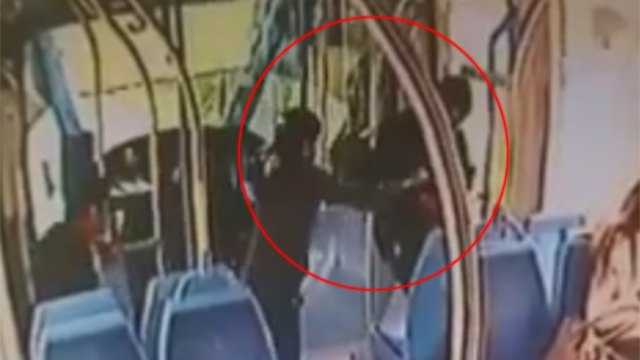
Ali Allkam, a 13-year-old terrorist, already thinking about death
Walking to their death: The new child terrorists
Analysis: Palestinian children go out to stab their Jewish victims thinking they are about to die, just like the terrorists of the second intifada who blew themselves up on buses and in markets; the significant difference is in their source of motivation.
Brothers Muawiyyeh and Ali Alkam, aged 11 and 13, from the Shuafat refugee camp in East Jerusalem, will have their names go down in the record book thanks to the dubious title "the youngest terrorists."

It's sad that at their age, they are already thinking about death. Miserable children who have lost their childhood, and whose lives are drowning in despair, frustration and hatred, which lead them to grab a knife and kill or try to kill a Jew.
The knifing terror is an act of suicide: The children with the knife go out to stab their victims thinking they are about to die, just like the terrorists of the second intifada who blew themselves up on buses and in markets.
But there is one significant difference: The suicide bombers with the explosive belts were filled with motivation to speed up the liberation of Palestine; they headed towards their death out of hope, with joy, believing that they were contributing to their people's struggle through their acts. The suicide was a sort of religious patriotism. The Palestinian society, from then-Palestinian Authority Chairman Yasser Arafat to the mothers, encouraged the suicide bombers, mainly by nurturing the myth of the shahid (martyr) in heaven - which promised the suicide bombers a pleasure-filled eternal life.

This week's attack on Jerusalem's Light Rail. Despair, frustration and hatred are leading children to grab a knife and kill or try to kill a Jew
Walking towards one's death in the current wave of terror, on the other hand, stems from despair and loss of hope. The helpless Palestinian society supports the acts of the young stabbers and mainly honors them in the funerals, but it can't even give them the hope of the shahid in heaven which the myth promises.
The Palestinian street is hopeless about the ongoing occupation, the Palestinian Authority and its leadership, and the attitude of the Arab and Western world, and is therefore not stopping the children. This is a society stuck in a "psychological lock," in circles of despair which feed the hatred and encourage the youth to grab a knife. It's the only way which they believe will lead to a change in their national situation and personal future.
And another change compared to the second intifada is that the current violence evolves from a knife to a vehicular attack, without a leadership or headquarters, without orders and instructions, without direction and without a political goal. It is driven by the power of collective emotional orientation of anger, rage, hopelessness and a strong desire for revenge.
This situation is the result of the past seven years: Since Prime Minister Benjamin Netanyahu won the elections, the peace process has disappeared along with the reconciliation mechanisms and the trust-building gestures which were occasionally offered to the Palestinians and helped maintain the calm and give some hope.
Before their eyes, the Palestinians saw settlement growth, the intensification of the religious conflict and the "price tag" activities which, in their eyes, are backed by the government. And more than anything, they fail to see a glimmer of light at the end of the occupation tunnel. No society - not just Palestinian society - can exist without hope. When there is no hope, desperation increases and frustration grows, accelerating the circles of hatred, revenge and violence.
The series of gestures which the Netanyahu government is offering the Palestinians are a mockery: Advancing master plans for the population in the territories, a certain increase in the number of work permits in Israel, and a special bonus - upgrading the cellular network infrastructures in the West Bank and Gaza. These are worthless ideas, which do not contribute towards calm.
The flames can only be lowered through actions which can convince the Palestinians that Israel's intentions are serious. For example, if those who torched the Dawabsheh family's home are arrested, if cameras are installed at the Al-Aqsa Mosque, if Israel announces a settlement construction freeze, if the Palestinians are given freedom of movement and if the work permits in Israel are increased considerably.
Serious intentions also mean bringing the word "peace" back into the Israeli political-public discourse (the Palestinians are not the only ones in need of this discourse, so are we). Israel must quickly think about calming policy moves, out of the box of force, before the current wave of terror loses its head and takes us back to the days of the second intifada.
Dr. Ronni Shaked, Yedioth Ahronoth's former correspondent and commentator on Palestinian affairs, is a research fellow at the Harry S. Truman Research Institute for the Advancement of Peace at Hebrew University.










